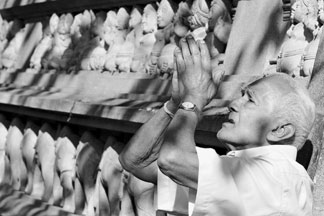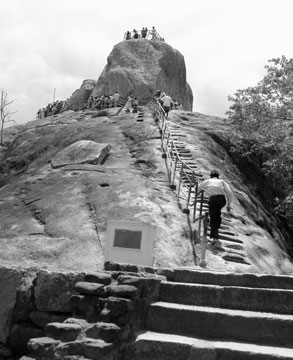Emperor Asoka's mission - harbinger of Buddhism
by Amal HEWAVISSENTI
 The significance of Poson Poya goes back to the religious mission of
Emperor Asoka of India. Young Asoka left behind a carnage in the battle
to capture the country of Kalinga. The blood-shed brought about in his
efforts to be the greatest monarch eventually drove him into the path of
peace. The significance of Poson Poya goes back to the religious mission of
Emperor Asoka of India. Young Asoka left behind a carnage in the battle
to capture the country of Kalinga. The blood-shed brought about in his
efforts to be the greatest monarch eventually drove him into the path of
peace.
He was resolved to re-establish ties with his neighbours and sent
Buddhist envoys to them. However, Asoka's principles made a provincial
religion a renowned world religion but he respected others' right to
their religious beliefs.
Diplomatic ties
Emperor Asoka was highly successful in conducting diplomatic
relations with countries around his empire. His inscriptions record the
names of rulers with whom he had imperial relationship. Antiochus Theos
of Syria, Ptolemi Philadelphus of Egupt, Alexander of Epyrus, Magus of
Syrine, Antigonus Gonatus of Macedonia were among the rulers with whom
he had established new ties. He believed he could impress his new
religious policies on the neighbours and acquire spiritual leadership of
the continent.
Emperor Asoka's policies
His inscriptions state that he planted fruit trees for food and
shade, constructed wells and revamped the network of roads. Moreover, he
planted medicinal herbs. He appointed a special team of ministers
(Dharma Mahamathra) to give effect to his vision throughout the empire.
Buddhism began to shape itself into a global religion and Buddhist
envoys were sent within India and outside in his bid to make Buddhism a
universal religion. He blended his personal principles and feelings with
the values of popular Buddhism. He focused on the value of nonviolence
and acknowledged the fact that all citizens are his own children. Says
another inscription of Asoka, "the great king pays respects to all
people belonging to diverse religions and clans".
 His royal expeditions were replaced by royal visits to religious
places. His royal expeditions were replaced by royal visits to religious
places.
Asoka's religious learnings
Emperor Asoka nurtured great ambitions to be the greatest religious
ruler and was determined to re-establish prosperity within his empire.
His inscriptions were the mouth-piece of the moral values he believed
in. He earnestly believed in the concept that earning wealth moderately
and spending it wisely was the most sensible way to handle one's
economy.
Therefore, his "Dhamma" meant a course of action followed by a man
with a common sense. The chief ingredients of his religious principles
are good will and non violence.
Impact on Sri Lankan culture
King Asoka's Buddhist mission headed by Arhat Mahinda Thera added a
new dimension to the Sri Lankan culture and religion at large.
Historical proof shows that the culture prevalent in Sri Lanka before
the advent of Arhat Mahinda Thera lacked unrefinement. Some scholars
flatly contradict this story because no reference to a Buddhist mission
to Sri Lanka is to be found in any of Asoka's inscriptions. But
Mahavamsa strongly supports the records that Emperor Asoka mapped out
the Buddhist mission to Sri Lanka under the leadership of Mahinda Thera.
Inscriptions found at Sanchi Stupas by Alexander Cunningham indicate the
names of Monks believed to have been sent to different countries to
disseminate Dhamma as recorded in Mahavamsa. Much of what Sri Lankan
chronicles have established are borne out by Indian inscriptions.
Although the Aryans settled down in Sri Lanka three centuries ago the
Sri Lankan culture nourished by Buddhism bore a fresh identity during
the reign of King Devanam Piya Tissa. That the King Tissa accepted the
emperor's designation of "Devanampiya", and embraced the new religion
and culture implies that there had been close diplomatic ties between
them. However, during the long reign of king Tissa, Buddhism occupied
every aspect of Sri Lankan Society. Apart from Arhat Mahinda's legacy,
the king must have been impressed with Asoka's ideology which said, "It
is difficult to win this world without a liking for Dhamma, without
self-examination, without conforming to Dhamma, without respect for
Dhamma. Under my leadership, my ministers follow the principles of
Dhamma clear any person of disbelief in Dhamma. My motive is to organise
and run the government and please my people. It is my command...". These
principles by Asoka have invariably inspired the kingship and the
culture of Sri Lanka.
The Sri Lankan culture, a blend of various religions and cultural
traits before the advent of Arhat Mahinda Thera, became one culture with
religious, social, political and educational resurgence after his
arrival. With the development arts and crafts, ethics values and
education, a new Sri Lankan culture was spawned under State patronage.
The Poson is the season which marks the transformation of a primitive
society into a refined culture that is today. |

